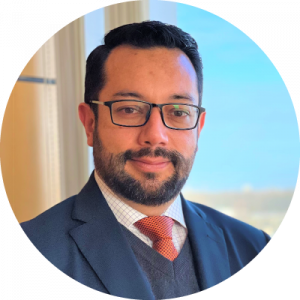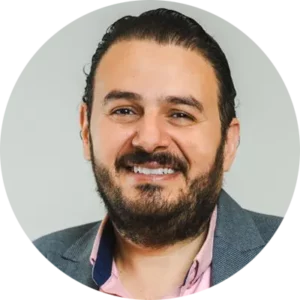The Robotics and Additive Technologies Innovation Research Cluster is at the forefront of cutting-edge research in Robotics, Additive Manufacturing (AM), and Computer Vision. Our primary focus is on Wire Arc Additive Manufacturing (WAAM), a groundbreaking metal-based 3D printing technology.
Our Work
Our dedicated team of researchers and engineers is committed to advancing the fields of AM, Robotics, and Computer Vision through innovative projects and collaborations:
- Robotics: Our robotics research focuses on advancing industrial, mobile, and autonomous robots. We design optimized robotic systems, create intelligent algorithms to enhance efficiency and capabilities, and rigorously test these innovations in manufacturing applications.
- Additive Manufacturing: We explore the latest developments in materials science, design and develop state-of-the-art robotic WAAM systems, and integrate these technologies into real-world industrial applications.
- Computer Vision: Our Computer Vision team builds cutting-edge algorithms for visual data analysis across various applications. We prioritize integration into real-world systems, handle complex datasets, and extract valuable insights to drive innovation.
Through cross-disciplinary projects that span WAAM, Robotics, and Computer Vision, our cluster aims to pioneer new technologies, develop robotic systems for the future, and drive innovation across industries.
AdditiveLab: Our State-of-the-Art Facility
To support our research efforts and ensure the highest productivity of our solutions, TSI has established AdditiveLab – a state-of-the-art additive manufacturing research and solutions laboratory. AdditiveLab is the only facility of its scale in Latvia and the Baltic states, providing unparalleled research and development capabilities in metal wire additive manufacturing (WAM).
Our lab specializes in printing large parts on demand using solid metal wire, which can be utilized in various industry applications, including transportation, aerospace, and general manufacturing. AdditiveLab’s machines can work with a wide range of materials, such as aluminum alloys, nickel-based alloys, construction steels, and stainless steels.
In addition to our manufacturing capabilities, AdditiveLab actively works on software development to control robots, manage the manufacturing process, and predict and maintain various technological parameters and features. This ensures that our solutions are not only innovative but also efficient and reliable.
RD1. Additive Manufacturing (WAAM)
Staff: Arseny Kisarev, Adham Elmenshawy
Materials Research: Focuses on wire materials, alloy formulations, and advanced feedstocks tailored for WAAM processes.
Robotic Systems & Process Development: Works on robotic manipulator movement, weld torch positioning, process parameters, and real-time process control.
Application & Integration: Explores and integrates WAAM processes into specific industrial applications.
RD2. Robotics
Staff: Emmanuel Merchan, Samuel Moveh, Aleksandrs Kraunikovs, Vasily Gredasovs, Igor Laksa, Ivan Gercevs
Industrial Robotics: Focuses on the design, programming, and application of robots in manufacturing and other industry settings.
Mobile Robotics: Deals with robots that move in various environments, potentially using sensors to navigate.
Optimization Algorithms & Heuristics: Develop advanced algorithms for robot tasks, movement optimization, and task efficiency.
RD3. Computer Vision
Staff: Aleksandrs Grakovski, Samuel Moveh
Algorithm Development: Creates algorithms for image and video analysis, and computer vision which can be utilized across various applications.
Integration: Works on integrating computer vision systems into different applications.
Data and Analytics: Handles datasets and draws insights from visual data.
Klastera dalībnieki
Klastera vadītājs:
,

Academic degree and current position in TSI: Professor at the Transport and Telecommunication Institute, Dean of the Engineering Faculty,
Previous experience: Over 20 years as a Professor at the Instituto Politécnico Nacional in Mexico City, serving in various leadership roles including Academic Vice-Chancellor, Executive Secretariat of COFAA-IPN, General Coordinator for Staff Development and Educational Innovation, Dean of Higher Education, and Director of the School of Mechanical and Electrical Engineering.
Membership: Member of IEEE, collaborating with the Robotics and Automation Society. Since 2023, a member of the Latvian Council of Science as an expert in the field of Engineering and Technology – Electrical Engineering, Electronics, Information and Communication Technologies, and a member of the Engineering and Technology Expert Commission.
Academic experience: Author of numerous publications in journals such as IEEE Access, Results in Engineering, and MDPI Sensors. Supervised over 55 undergraduate theses, 11 master’s theses, and 7 doctoral dissertations at IPN, the last 2 Doctoral dissertations supervised as TSI staff.
Teaching at post- and graduate level: Courses in Robotics, Engineering Design, and Soft-Computing at both graduate and undergraduate levels.
Participation in projects: Participated in and led various research projects focused on robotics, optimization techniques, biomechanics, and mechanical design.
Research Interests: Robotics, Trajectory Planning, Soft Computing, Mechanical Design Optimization, and Biomechanics.
Awards: Recognized for innovative leadership in academia and research, aiming to advance engineering education and tackle the challenges posed by Industry 4.0.
Additive Manufacturing Lead:

Academic degree and current position in TSI: dipl. Engineer, dipl. Researcher, currently head of Additive Lab
Previous experience: 10+ years’ experience in welding technology, 8+ years’ experience with industrial robotics, 6+ years’ experience in metal additive manufacturing r&d.
Academic experience: Author of a several publications in journals, supervised 5 master’s theses, currently supervising 1 PhD student and 4 undergraduate students.
Teaching at post- and graduate level: Practice course in Wire-based additive manufacturing, courses in robotic welding, aluminium alloys welding technology.
Participation in projects: Participated in and led various research projects focused on robotics, 3d printing and industrial automation.
Research Interests: Wire-based additive manufacturing, aluminium alloys, industrial robotics, control systems.
Robotics Lead:
,

Academic degree and current position in TSI: Professor at the Transport and Telecommunication Institute, Dean of the Engineering Faculty,
Previous experience: Over 20 years as a Professor at the Instituto Politécnico Nacional in Mexico City, serving in various leadership roles including Academic Vice-Chancellor, Executive Secretariat of COFAA-IPN, General Coordinator for Staff Development and Educational Innovation, Dean of Higher Education, and Director of the School of Mechanical and Electrical Engineering.
Membership: Member of IEEE, collaborating with the Robotics and Automation Society. Since 2023, a member of the Latvian Council of Science as an expert in the field of Engineering and Technology – Electrical Engineering, Electronics, Information and Communication Technologies, and a member of the Engineering and Technology Expert Commission.
Academic experience: Author of numerous publications in journals such as IEEE Access, Results in Engineering, and MDPI Sensors. Supervised over 55 undergraduate theses, 11 master’s theses, and 7 doctoral dissertations at IPN, the last 2 Doctoral dissertations supervised as TSI staff.
Teaching at post- and graduate level: Courses in Robotics, Engineering Design, and Soft-Computing at both graduate and undergraduate levels.
Participation in projects: Participated in and led various research projects focused on robotics, optimization techniques, biomechanics, and mechanical design.
Research Interests: Robotics, Trajectory Planning, Soft Computing, Mechanical Design Optimization, and Biomechanics.
Awards: Recognized for innovative leadership in academia and research, aiming to advance engineering education and tackle the challenges posed by Industry 4.0.
Computer Vision Lead:
,

Academic degree and current position in TSI: professor, leading researcher of the Engineering Faculty, Director MSc Program “Computer Engineering and Electronics”.
Previous experience: for more than 6 years was Dean of Computer Science and Telecommunication Faculty (Engineering Faculty), Head of Telecommunication Department in Transport and Telecommunication Institute (TSI), founder of the Laboratory of Image Processing, Biometry & Automated Border Control Systems in TSI.
Membership: Member of ECTRI (since 2017), Latvian Operations Research Society, Latvian Higher School Professors Association; member of European Engineering Deans Council (2012-2013); has been a member of the steering and programme committee of the International Conference on Innovative Vocational Education and Training in Transport Area (IVETTA), 2005; programme committees of the International Conference Reliability and Statistics in Transportation and Communication (RelStat), Latvia, (10 events), Dependability of Computer Systems (DepCoS-RelMex), Poland (3 events), etc., and reviewer in transportation journals and conference proceedings. Member of Editorial Board of Journals: Transport and Telecommunication (WoS, SCOPUS), Computer Modeling and New Technologies (2012), etc.
Academic experience: Author of more than 90 publications, incl. 14 books and textbooks, chapters in the book “Sensor Network Technology Applications in the Water Supply and Transport Systems”, Ribickis, L., et al. (Scientific Monograph, Riga, RTU Press, 2017, in Latvian), papers in International Journal of Transport, Transport and Telecommunication, Mathematical Modelling and Analysis. An Expert in Transport and Logistics (2008-2021) and Civil Engineering (since 2021) at the Latvian Council for Science; member of the PhD promotion committee. Member of the expert working group of the Electronic Communications Sector Council of the Ministry of Transport of the Republic of Latvia (since 2010).
Teaching at post- and graduate level: System Theory (Dr.ing. in Telematics and Logistics, TSI); Computer Vision and Image Processing (MSc in Computers Science, TSI); Laboratory Research Workshop (MSc in Electronics, TSI); etc.
Participation in projects: as a leading researcher has participated in more than 15 European and Latvian research projects and 2 national transportation studies, has been a scientific coordinator in 4 of them, has participated in COST Action TU0804, Horizon 2020, FP, INTERREG, BSR programme’ s projects.
Research Interests: Mathematical modelling, numerical methods, dynamics of chaotic systems, signal and image processing in different fields (transportation sphere, biometry, networks, logistics and others).
Supervised Doctoral, Master and Bachelor Theses: Promoted 1 Doctoral, more than 50 Master theses and 60 Bachelor theses, an official reviewer of 8 PhD theses.
Awards: by Latvian Education Fund in Computer Science (2017), IT industry (X-Infotech, 2016-2017), Riga Municipality (2010).
Autonomous Vehicles:
,

Academic degree and current position in TSI: Doctor of Philosophy, Associate Professor at the Transport and Telecommunication Institute.
Previous experience: With over 13 years of extensive academic teaching and research experience in various universities across Africa, Asia, and Europe. My roles have ranged from serving as a member of various academic planning committees and an academic advisor, where I guided students in their educational and career paths, to leading the ERASMUS program, where I facilitated international student/staff exchange and collaboration.
Membership: Member of IEEE, collaborating with the Robotics and Automation Society. Since 2024.
Academic experience: Author of numerous publications in journals such in IEEE Explore, MDPI Sensors and Electronic. Guest editor/reviewer for several academic journals and international conference
Teaching at post- and graduate level: Courses in control, aviation, Mechanical Engineering Design, and Computing at both graduate and undergraduate levels.
Participation in projects: Participated in a few research projects focused on control systems, tracking, facial recognition, computer vision, and sustainability, and currently leading a robotics, and mechanical design project.
Research Interests: Control, Autonomous systems, Robotics, Trajectory Planning, Soft Computing, Mechanical Design Optimization, and sustainability.
Design and Development:
,

Academic degree and current position in TSI: Doctor of science PhD, Assistant Professor at the Transport and Telecommunication Institute.
Previous experience: for more than 6 years was lecturer and researcher engineering Faculty, Department in Transport and Telecommunication Institute (TSI), also lecturer and researcher at aerospace and aviation engineering institute in Riga technical university.
Academic experience: Author of numerous publications in journals such as Springer. Guest reviewer for several academic journals and international conference.
Teaching at post- and graduate level: Courses in aviation, Aircraft Engines and design, Aircraft gas liquid systems, aircraft structure, Reliability engineering, Material Engineering, Physics and Engineering modeling and simulation at both graduate and undergraduate levels.
Participation in projects: has participated as a researcher in 2 Europe research projects first one (Development of an Innovative Supersonic Aerodynamic Tunnel and Aerospace Object Research Methodology). Second one (Design and development of an aerodynamically efficient unmanned aerial vehicle (UAV)implementing an environmentally friendly 4R circular economy concept in aviation (4R-UAV)).
Research Interests: Computational Fluid dynamics, Modeling and simulation, Robotics, Mathematical modelling, numerical methods, UAVs and others).
Supervised Doctoral, Master and Bachelor Theses: Promoted 1 Doctoral, more than 12 Bachelor theses, an official reviewer of 7 Bachelor theses, and 1 master theses.